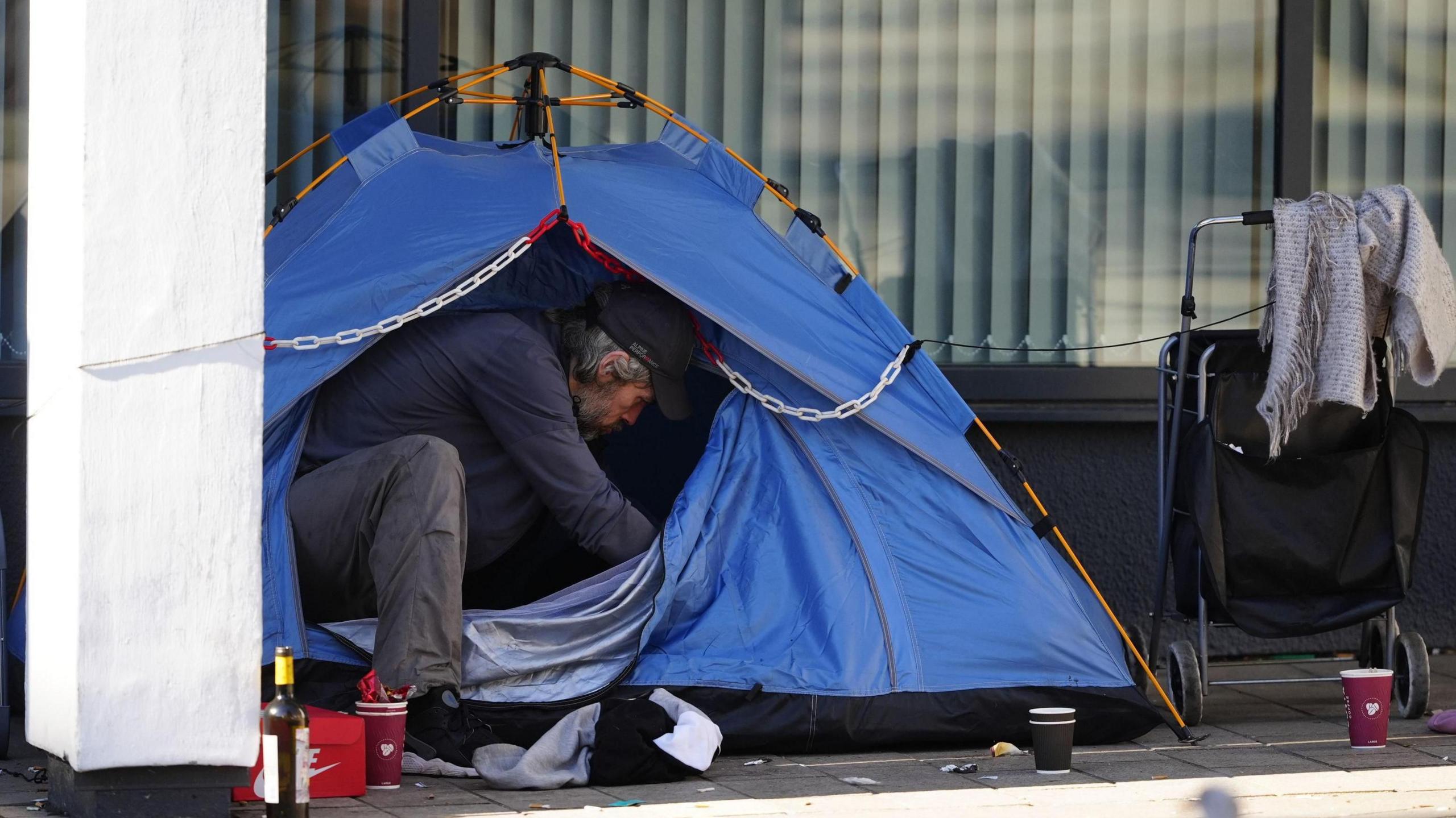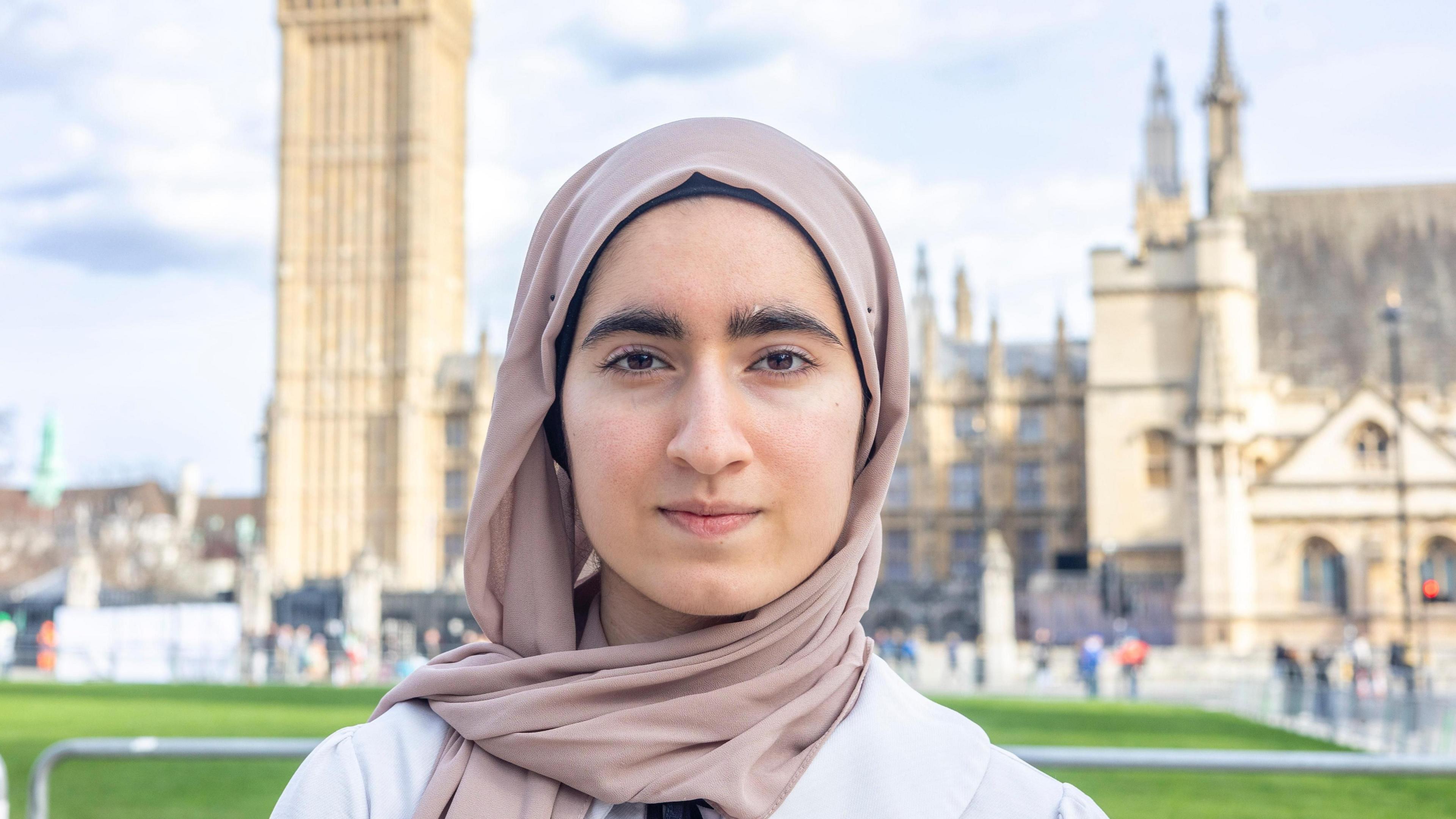Homelessness charity to become landlord for first time

- Published
The charity Crisis is to become a landlord for the first time in its history, saying it is now "nearly impossible" to find housing for homeless people.
Chief executive Matt Downie said the charity was planning to buy its own housing stock because the shortage of social housing and the cost of renting from private landlords meant this was the "only option left".
It comes as new research by Crisis found nearly 300,000 families and individuals in England are experiencing the worst forms of homelessness - a 21% increase since 2022.
The government says it is investing more than £1bn in homelessness services this year, while also promising "the biggest boost to social housebuilding in a generation".
Under the initiative, which was first reported by the Guardian newspaper, external, Crisis is hoping to buy 100 homes in London and Newcastle over the next three years to house people experiencing homelessness who are accessing the charity's services.
If the scheme is successful it could then be rolled out to other parts of the country, with an ambition to buy at least 1,000 homes over the next decade.
Mr Downie told the BBC the charity, which was founded in the 1960s, was hoping to start purchasing homes in the next few months, with the first tenants moving in next year.
"There's now a backlog for social housing with waiting lists of more than a million people," he said.
"Local councils just can't cope with that level of demand for their services."
He said there had been a "systematic sell-off of social housing", which began under Margaret Thatcher in the 1980s and had continued under every government since.
"Until we see a mass expansion of social housing again, we will be in this situation where [homelessness providers] have to do something extraordinary, which is outside of what we were normally set up to do, in order to make sure people have got somewhere to live," he added.
The government has committed £39bn over the next 10 years for its Social and Affordable Homes Programme, which it says will deliver around 300,000 homes across England, with at least 60% of these social housing.
Social housing, which is provided by not-for-profit housing associations or local councils, is more affordable as rents are linked to local incomes.
Mr Downie welcomed the funding but added: "Unless a big proportion of that is social housing and there are spades in the ground now then there's no hope any time soon of us having the housing that's needed as demand increases."
Crisis is also calling for housing benefit to reflect the true cost of private renting.
Affordable housing quota for London falls to 20%
- Published23 October
London social housing waiting lists at decade high
- Published23 January
Welcome for housing pledge - but is it too late for some?
- Published11 June
It comes as new research by the charity found the number of homeless people in England is higher than official government data suggests.
Crisis says around 189,000 families and individuals who faced the worst forms of homelessness such as rough sleeping, sofa surfing and living in tents were not included in official statistics.
Official data is based on people declaring themselves as homeless to a local authority, which Crisis says often does not happen.
The charity says one of the drivers behind the figures is a large increase in the number of people housed in unsuitable temporary accommodation, such as unsafe B&Bs and properties far away from family and friends.
When someone declares as homeless to the local authority, they can be placed in temporary accommodation while they search for a permanent home.
The research from Crisis, which was produced by Herriot-Watt University, says the number of households placed in unsuitable temporary accommodation has jumped from 19,200 in 2020 to 46,700 in 2024.
They say an additional 18,600 households are living in "unconventional accommodation" such as cars, sheds and tents.

Isra, who came to the UK in 2009 aged six, says her family was housed in unsuitable temporary accommodation
Crisis says that many of the people included in their research do not meet the threshold set by government and councils to be eligible for homelessness support, such as those sleeping on friends' sofas.
Isra came to the UK in 2009 aged six, after her parents fled war in Iraq.
For most of her childhood, her family was housed in more than 10 different temporary accommodation locations around London, which she says were often unsuitable.
Isra says she and her siblings were sometimes sleeping four to a room and that the places they were housed in were often infested with rats.
She says she remembers her mother "sifting through bags of rice because there were so many rats, we'd found rat droppings in our food".
Isra says the conditions she and her family lived in made it difficult to make friends at school or focus on her studies.
Labour's election manifesto last year promised to implement a new cross-government homelessness strategy, which would work with mayors and councils across the country "to put Britain back on track to ending homelessness".
Some Labour figures have become concerned that no such strategy has yet been launched, but it is expected to happen before the end of the year.
A government spokesperson said: "Everyone deserves a safe place to call home, which is why we are investing more than £1bn in homelessness services and launching a homelessness strategy to tackle this issue.
"This is alongside accelerating efforts to tackle the root causes of homelessness by abolishing Section 21 'no fault' evictions, and expanding access to safe accommodation."
'People should not be dying on the streets'
- Published22 October
TfL spends £113k to crack down on rough sleepers
- Published25 October
London's 'spiralling' housing crisis in numbers
- Published4 May

Sign up for our Politics Essential newsletter to keep up with the inner workings of Westminster and beyond.